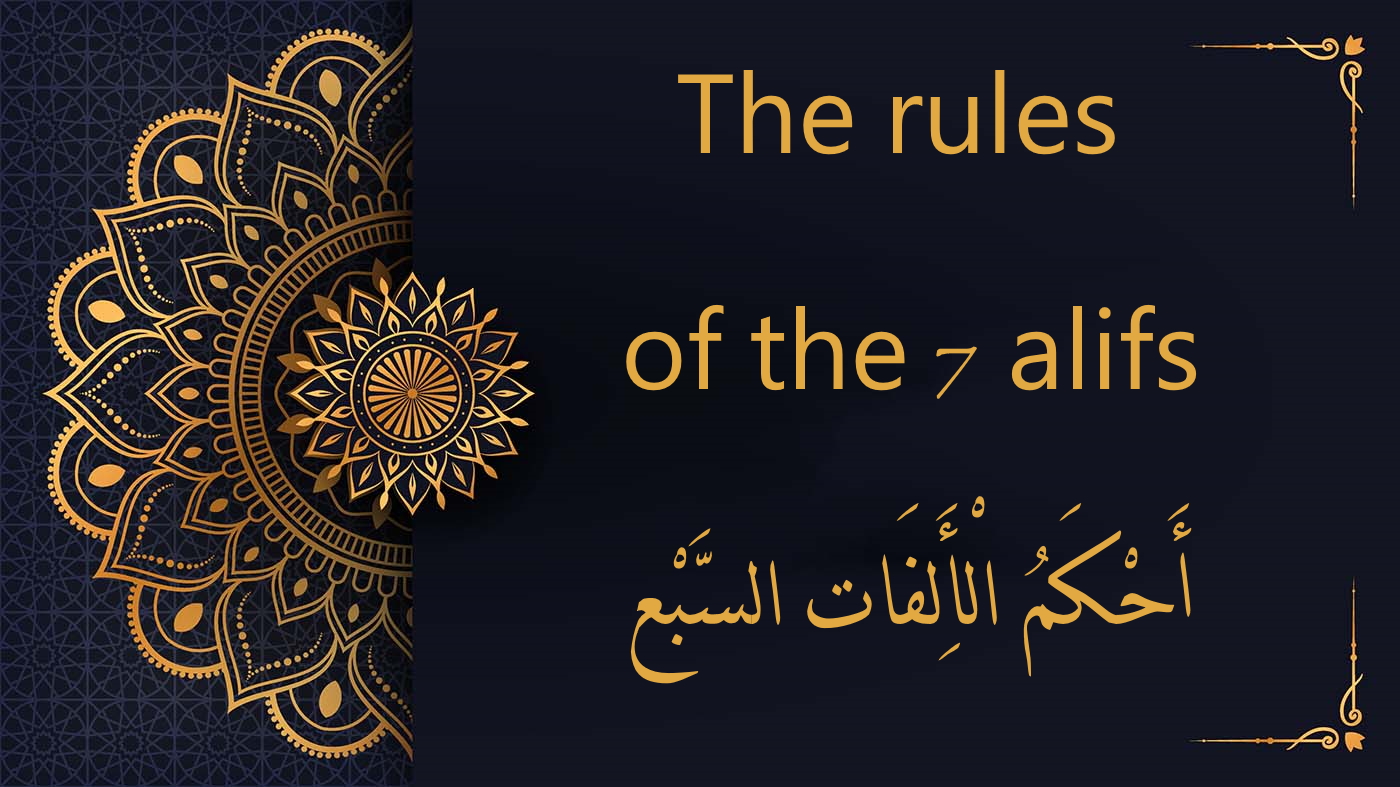
In the intricate tapestry of Tajweed, specific rules govern the pronunciation of letters, enhancing the beauty and precision of Qur’anic recitation. One such rule pertains to the letter ‘alif’ – ا, which, although ubiquitous in the Holy Qur’an, has unique pronunciation characteristics when located at the conclusion of seven specific words.
The distinctiveness of this ‘alif’ lies in its vocalization. It is only enunciated when a reciter chooses to pause upon one of these select words. The words that carry this special rendition of ‘alif’ are as follows:
Don’t want to go through the translation anymore?
30 free minutes with your qualified Egyptian teacher.
This rule is consistently applied throughout the entirety of the Holy Qur’an.
Example:
قُلْ إِنَّمَا أَنَا بَشَرٌ مِّثْلُكُمْ
Say, “I am only a man like you (18:110)
This word can be located in Sura Al-Kahf, specifically in verse 38.
لَّـٰكِنَّا هُوَ اللَّهُ رَبِّي وَلَا أُشْرِكُ بِرَبِّي أَحَدًا
But as for me, He is Allah, my Lord, and I do not associate with my Lord anyone. (18:38)
This word appears in Sura Al-Ahzab, precisely in verse 10.
Example:
وَتَظُنُّونَ بِاللَّهِ الظُّنُونَا
and you assumed about Allah [various] assumptions. (33:10)
This word is referenced in Sura Al-Ahzab, at verse 66:
يَوْمَ تُقَلَّبُ وُجُوهُهُمْ فِي النَّارِ يَقُولُونَ يَا لَيْتَنَا أَطَعْنَا اللَّهَ وَأَطَعْنَا الرَّسُولَا
The Day their faces will be turned about in the Fire, they will say, “How we wish we had obeyed Allah and obeyed the Messenger.” (33:66)
This word can be spotted in Sura Al-Ahzab, verse 67.
وَقَالُوا رَبَّنَا إِنَّا أَطَعْنَا سَادَتَنَا وَكُبَرَاءَنَا فَأَضَلُّونَا السَّبِيلَا
And they will say, “Our Lord, indeed we obeyed our masters and our dignitaries, and they led us astray from the [right] way. (33:67)
This word is present in Surah Al-Insan, verse 15. For the word in the subsequent verse, the letter ‘alif’ ا is not pronounced, regardless of whether one stops or continues the recitation.
وَيُطَافُ عَلَيْهِم بِآنِيَةٍ مِّن فِضَّةٍ وَأَكْوَابٍ كَانَتْ قَوَارِيرَا
And there will be circulated among them vessels of silver and cups having been [created] clear [as glass], (76:5)
In Surah Al-Insan, this word is highlighted in verse 4. When choosing to pause during recitation, another pronunciation option emerges:
سَلاسِلْ
إِنَّا أَعْتَدْنَا لِلْكَافِرِينَ سَلَاسِلَاْ وَأَغْلَالًا وَسَعِيرًا
Indeed, We have prepared for the disbelievers chains and shackles and a blaze. (76:4)
This Tajweed rules lesson has concluded. Insha’Allah, the next lesson will cover the Nabr – the elevation of the voice.
At the Al-dirassa Institute, we provide an accessible path to mastering Tajweed under the guidance of skilled instructors. Should you wish to pursue this further, we warmly invite you to reach out to us.
Discover the experiences of our delighted clients who have thoroughly enjoyed utilizing this standout feature.
Alhamdulillah I‘m very pleased with the arabic and Qur’an lessons I receive from teacher Umm Tasneem and I‘m also content with the al-dirassa administration team who were very quick in answering any questions I had. In a month I progressed a lot and I cannot wait to continue my studies with al-dirassa. May Allah reward everyone at al-dirassa.
Verified review - view original
My Qur’an teacher is fantastic, she teaches me in a loving and kind way where I look forward to the lessons and learn so much. My Arabic teacher is equally as nice and has a lot of patience with me, she has great expertise in the field and I’ve progressed really quickly with her. Thank you Al-dirassa!
Verified review - view original

Al-dirassa Institute offers you a gift to help you begin your journey to being fluent in Arabic and learning the Quran.

Al-dirassa Institute offers you a gift to help you begin your journey to being fluent in Arabic and learning the Quran.